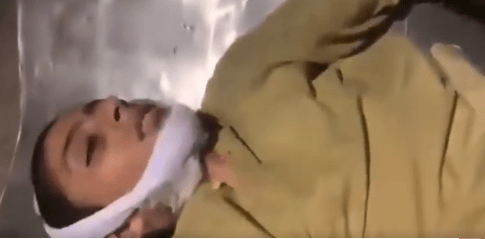In a tragic and heart-wrenching incident that has shaken the community, a 14-year-old boy named Farhan was brutally beaten to death by his madrasa teacher, Qari Muhammad Umar, and his son, Ihsan Ullah, in the Chalyar area of Khwazakhela Tehsil, Swat. The horrifying images of Farhan’s battered body, covered in red and purple bruises from the merciless lashes, circulated on social media, sparking outrage and disbelief.
According to Farhan’s grandfather, the young boy had been hesitant to return to the madrasa, revealing that he had been subjected to not only physical violence but also inappropriate demands from his teachers. Despite these grave accusations, Farhan’s father dismissed the concerns, insisting that his son return. The following day, Farhan’s uncle escorted him to the madrasa and pleaded with Qari Muhammad Umar to avoid punishing him, explaining that Farhan had missed class due to a relative’s wedding. The Qari feigned compliance, but once the uncle left, the true horror unfolded. Farhan was subjected to an inhumane beating, with not a single part of his body left untouched—except his face.
Grief-stricken, Farhan’s grandfather mourned, “It would have been easier if my child had been killed by a bullet rather than enduring this torture. He must have begged and pleaded with his teachers to spare him, but they showed no mercy.”
A fellow student, who witnessed the tragic event, recalled the harrowing moment: “At around 2 PM, one teacher cornered Farhan in a room and beat him with a stick until it broke. Then, Qari Muhammad Umar entered, locked the door, and whipped him until he grew tired. Farhan collapsed, asking for water, drinking it, shaking his head three times, and died in my lap.”
Outrage erupted in the community of Khwazakhela, with residents pouring into the streets, demanding justice for Farhan. Dr. Amjad Ali Khan, the elected Member of the National Assembly from Swat, condemned the brutal act, declaring, “This was not a madrasa, but a torture cell. This institution will be sealed, and we will make an example of this case.”
Farhan’s death is a stark reminder of the pervasive culture of corporal punishment in some madrasas, where children are subjected to unimaginable cruelty under the guise of discipline. A study on corporal punishment in madrasa in Khyber Pakhtunkhwa revealed that 83% of madrasa students report experiencing physical abuse, including beatings with sticks, slaps, and forced standing for hours. This brutal form of punishment not only leaves visible scars but inflicts deep emotional and psychological trauma, leading to aggression, anxiety, and depression.
Despite legal efforts to curb corporal punishment, including the 2024 ban in private schools, the practice remains widespread, particularly in unregistered madrasas where there is little to no oversight. The absence of regulation and accountability creates an environment where children’s rights are disregarded, and abuse goes unchecked. As one journalist pointed out, there is no official data on madrasas, and when abuse occurs, it is often swept under the rug through informal tribal councils instead of the justice system.
Imran Takkar, a rights activist from Khyber Pakhtunkhwa, voiced the urgent need for systemic change. “Corporal punishment is a harsh reality that many children face, leaving them with physical and emotional scars. It’s our responsibility to protect and empower them, not inflict harm and fear.” He emphasized that children who experience such violence are more likely to develop mental health issues and behavioral problems.
This devastating incident serves as a call to action—a reminder that no child should ever endure such horrors in the name of discipline. It is time for society to stand up for the protection of children’s rights, to ensure that their safety, dignity, and well-being are prioritized above all else. The need for stricter regulations, greater accountability, and collective action has never been more urgent. Farhan’s life was tragically cut short, but his story should ignite a movement to end the systemic abuse that continues to haunt children in madrasas and other institutions.
